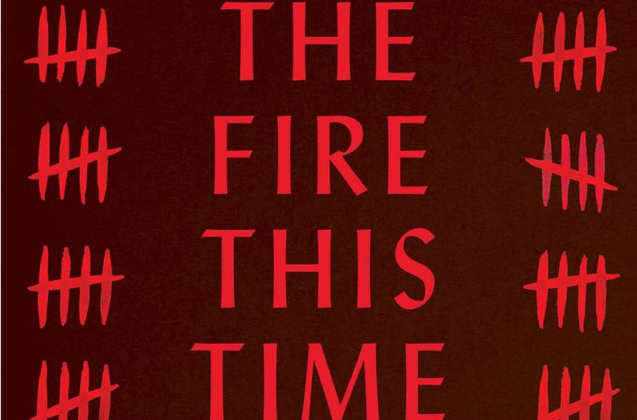From the dedication (“To Trayvon Martin and the many other Black men, women and children who have died and been denied justice for these last four hundred years”) to the list of contributing essayists (which includes Isabel Wilkerson, Kiese Laymon and Edwidge Danticat), it is immediately clear that Jesmyn Ward’s new anthology means serious business.
Just as its namesake, James Baldwin’s classic “The Fire Next Time,” did in 1963, “The Fire This Time: A New Generation Speaks about Race” explores the ways in which (despite what the Emancipation Proclamation says) Black people living in America are still not free. The 17 contributed essays are divided into three sections, each looking to either the past, the present or the future of Black people’s relationship with this nation.
Here are three key passages from the “The Fire This Time”:
From “Introduction,” by Jesmyn Ward:
I, too, grew up in a place that could sometimes feel as limiting and final as being locked in an airtight closet, the air humid and rank with one’s own breath and panic. A place where for all the brilliant, sun-drenched summer days, there is sometimes only the absence of light: America, and the American South. A place where the old myths still hold a special place in many White hearts: the rebel flag, Confederate monuments, lovingly restored plantations, “Gone with the Wind.” A place where Black people were bred and understood to be animals, a place where some feel that the Fourteenth Amendment and Brown v. Board of Education are only the more recent in a series of unfortunate events. A place where Black life has been systematically devalued for hundreds of years….
I know little. But I know what a good portion of Americans think of my worth. Their disdain takes form. In my head, it is my dark twin. Sometimes I wonder which of us will be remembered if I die soon, if I suffocate in that closet. Will I be a vicious menace, like Trayvon Martin? An unhinged menace, like Tamir Rice? A monstrous menace, like Mike Brown? An unreasonable menace, like Sandra Bland? A sly menace, like Emmett Till? I imagine I will be as black and fetid as the horde at Scarlett’s heels, crowding her wagon, thundering to rip it apart, wheel by rivet.
Replace ropes with bullets. Hound dogs with German shepherds. A gray uniform with a bulletproof vest. Nothing is new.
– –
From “Queries of Unrest,” by Clint Smith:
After Hanif Willis-Abdurraqib
Maybe I come from the gap
between my father’s teeth.
Maybe I was meant to see a little
bit of darkness every time he smiled.Maybe I was meant to understand that
darkness magnifies the sight of joy.
Maybe I come from where the sidewalk
ends, or maybe I just read that in a book once.
It can be hard to tell the difference sometimes.Maybe that’s because when I was a kid
a white boy told me I was marginalized
and all I could think of was the edge
of a sheet of paper, how empty it is—
the abyss I was told never to write into.Maybe I’m scared of writing another poem
that makes people roll their eyes
and say, “another black poem.”
Maybe I’m scared people won’t think
of the poem as a poem, but as a cry for help.Maybe the poem is a cry for help.
Maybe I come from a place where people
are always afraid of dying.
Maybe that’s just what I tell myself
so I don’t feel so alone in this body.
Maybe there’s a place where everyone is both
in love with and running from their own skin.
Maybe that place is here.Maybe that’s why I’m always running from
the things that love me. Maybe I’m trying
to save them the time of burying darkness
when all they have to do is close their eyes.
– –
From “The Condition of Black Life Is One of Mourning,” by Claudia Rankine:
A friend recently told me that when she gave birth to her son, before naming him, before even nursing him, her first thought was, I have to get him out of this country. We both laughed. Perhaps our black humor had to do with understanding that getting out was neither an option nor the real desire. This is it, our life. Here we work, hold citizenship, pensions, health insurance, family, friends, and on and on. She couldn’t, she didn’t leave. Years after his birth, whenever her son steps out of their home, her status as the mother of a living human being remains as precarious as ever. Added to the natural fears of every parent facing the randomness of life is this other knowledge of the ways in which institutional racism works in our country. Ours was the laughter of vulnerability, fear, recognition, and an absurd stuckness.
I asked another friend what it’s like being the mother of a Black son. “The condition of Black life is one of mourning,” she said bluntly. For her, mourning lived in real time inside her and her son’s reality: At any moment she might lose her reason for living. Though the white liberal imagination likes to feel temporarily bad about Black suffering, there really is no mode of empathy that can replicate the daily strain of knowing that as a black person you can be killed for simply being Black: no hands in your pockets, no playing music, no sudden movements, no driving your car, no walking at night, no walking in the day, no turning onto this street, no entering this building, no standing your ground, no standing here, no standing there, no talking back, no playing with toy guns, no living while Black.
